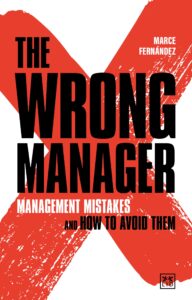|
Decision method to avoid management mistakes by Marce Fernández
By Guest Contributor Marce Fernández
Author of The Wrong Manager, Marce Fernández, reveals a proven method to help managers avoid making errors.
“There are two kinds of diseases of the soul: vice and ignorance.” Socrates is credited with the phrase that Plato developed in the Timaeus. According to the Greek philosophers, ignorance means believing you know when you don’t, and this could very well be the cause of most errors in human thinking. The worst thing that can happen to those sick with this delusion – still Plato´s ideas – is not to realize it, and to believe that they do not need the true knowledge.
Some centuries later, Professor Kahneman coined the acronym WYSIATI, which stands for “What You See Is All There Is” to express the overvaluation that we – managers included – assign to the things we already know – or think we know – about something. Believing that you know enough about a subject when there is still much to learn and find out, is a position of failure and the root of many management errors.
To confront WYSIATI, I have come up with this other acronym, WYSKBAD, which stands for “What You Should Know Before Any Decision.” Mastering WYSKBAD is one of the greatest merits that a decision-maker can acquire, although it is not that simple. You are going to need a method.
A method based on knowledge
As we have seen in previous articles and developed further in The Wrong Manager, lack of knowledge is one of the main causes of management errors. Other causes highlighted by managers include underestimating the risks they face and ignoring key elements of the context. If we add the cognitive biases we have also discussed in my previous piece, we conclude that managers need a decision-making method to help them:
- Not ignore any of the key elements with a relevant influence on the decision to make
- Get rid of the biases that tricked their mind when they have to make a decision
Let me note that a method is not a process. You are a unique manager, and you act according to your unique profile and experience. You do not need a utopian process of magic effects. There is no such thing, and you would never internalize it. You do not need a process but a method, which is something different. If you want to refine the way you make decisions to improve your chances of being right, there are a few things to consider. They are not steps of a process but clues to devise your own method.
You must understand that there are different types of decisions and distinguish between minor and majordecisions (The Wrong Manager includes a full discussion of this). You can use heuristics, the implicit knowledge provided by your experience plus your intuition, only when faced with a minor decision. Otherwise, trust me, you should forget about heuristics and adopt a method based on the points I expose below.
Important: be sure not to overlook the big picture. Some managers tend to focus only on the parts that directly affect the problem, and often neglect the bigger picture of the organisation. Since your decision is part of a complex system in which all factors are interconnected, you should never lose sight of the big picture.
Think about whether the context of the decision is certain or uncertain. If certain, it is likely that the problem can be solved by numerical calculation. If not, which will be the majority of cases, you should prepare for a thorough analysis beyond any possible numerical solution.
Do not take the objective of a decision necessarily for granted and try to understand its long-term implications. You cannot go against objectives, but you can certainly discuss, and refine them.
Don’t rush! Resist the temptation to respond immediately. You are likely to reply with an obvious solution drawn from insufficient elements. Let your mind mature the question, evaluate the options and contrast points of view before deciding.
Here comes the most critical: make sure you don’t ignore any key elements of the analysis. Draw up your own list of factors to consider and review it before making any decisions. Remember WYSKBAD – What You Should Know Before Any Decision: you will not be prepared until you have the necessary knowledge. You should weigh the effects of the potential decision in at least these four realms:
- Economic, industrial and social trends – it does not seem wise to take a decision against the tide;
- Risks – it is essential to make a rigorous assessment of the chances that the risks that a decision may incur materialize, and a proposal of the best way to deal with them;
- Counterparts – your decision will trigger the reaction of other people, so you should think about how a decision can affect others, what their response would be and how to take it into account before deciding;
- Resources and capabilities – an organisation’s resources and capabilities outline a kind of perimeter within which it must place its decisions. Decisions that go beyond this perimeter are likely to lead to failure.
Criteria should be part of any manager’s decision method. Criteria before defining the possible action alternatives and before making the final choice. Criteria inject neutrality into the method and are an excellent treatment against bias.
A final element of the method must be to visualize the implementation of the decision. This means anticipating how to communicate and deploy it. You can easily spot some previously missed drawbacks.
The design and application of a method based on the above principles benefits from an important but rarely demanded quality in a manager: humility. Many mistakes have been made because of the arrogance and stubbornness of managers. In The Wrong Manager, I talk about the alluring consequences of humility in decision-making. That would be the last element to put into practice: the humility that allows us to accept human limitations in the face of complex scenarios and challenges.
ABOUT THE AUTHOR

Marce Fernández is a management consultant and MBA educator. Prior to that, he was a senior executive in banking for 15 years. He is based in Spain.
Suggested Reading
 This book unravels the mystery that lies between success and failure, focusing on management mistakes. It uncovers the reasons behind most decision errors and shows how to deal with them successfully. It proposes a better approach to goal setting, risk assessment, context analysis, information processing, number crunching and personnel management. It also gives the keys to overcoming the long list of cognitive biases that managers suffer from (whether they know it or not). The book is written from the diverse and rich experience of the author and is based on the examples of dozens of real business mistakes.
This book unravels the mystery that lies between success and failure, focusing on management mistakes. It uncovers the reasons behind most decision errors and shows how to deal with them successfully. It proposes a better approach to goal setting, risk assessment, context analysis, information processing, number crunching and personnel management. It also gives the keys to overcoming the long list of cognitive biases that managers suffer from (whether they know it or not). The book is written from the diverse and rich experience of the author and is based on the examples of dozens of real business mistakes.
